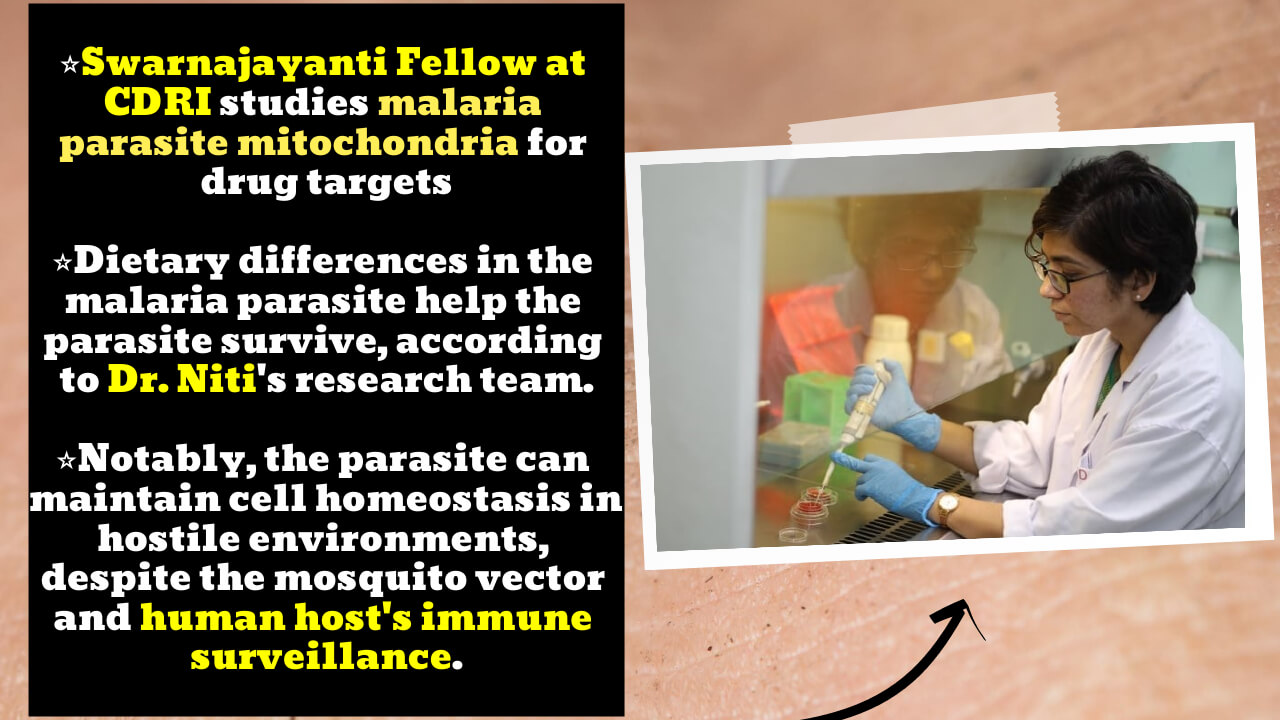Dr. Niti Kumar is attempting to identify proteins that influence the shape-function of the malaria parasite’s single mitochondrion and how it undergoes repair. Understanding these processes will aid in deciphering how the parasite adapts to environmental changes and reducing drug-induced toxicity.
Key Highlight:
- Dr. Niti Kumar is a scientist at the CSIR-Central Drug Research Institute in Lucknow.
- She is working with her research group to identify proteins that affect the shape-function of the malaria parasite’s single mitochondrion.
- Understanding these processes will aid in deciphering how the parasite adapts to environmental perturbations, reduces drug-induced toxicity, promotes infection recurrence following treatment completion, and relapses from dormant stages.
- Dr. Niti’s research group is taking a multi-pronged approach to elucidate how the malaria parasite benefits from structurally and functionally divergent genome and proteome maintenance pathways components.
- Her group is involved in developing antimalarial drugs and open-source drug discovery initiatives.
Dr. Niti Kumar, a scientist at the CSIR-Central Drug Research Institute in Lucknow and a 2020-21 Swarnajayanti fellowship awardee, is working with her research group to identify proteins that affect the shape-function of the malaria parasite’s single mitochondrion as well as how it undergoes repair. Understanding these processes will aid in deciphering how the parasite adapts to environmental perturbations, reduces drug-induced toxicity (phenotypic drug resistance), promotes infection recurrence following treatment completion, and relapses from dormant stages.
Malaria biology is an intriguing field not only from a biochemical or molecular standpoint but also because it explores fascinating cell biology/organelle biology issues. This intracellular parasite is remarkable for the complexity and divergence of its organellar structure. It contains a single mitochondrion that undergoes dramatic morphological changes, an apicoplast (a non-photosynthetic, remnant plastid), a highly dynamic endoplasmic reticulum, and lysosomes.
Experimental investigation of the biogenesis, division, and repair of these organelles in human malaria parasites has been minimal. The fission-fusion processes in parasite organelles, particularly at the mitochondrion-ER-lysosomes organelle interface, remain unknown.
Her group is investigating mitochondrial dynamics and inter-organelle communication during environmental stress and drug-induced toxicity to understand this area better.
“Because parasitic diseases are a low priority for pharmaceutical companies, sustained academic research efforts are required to investigate critical parasite pathways that may provide insight into alternative antimalarial sites or drug targets to combat emerging drug resistance, which will directly translate into societal benefits,” Dr. Niti explained.
Dr. Niti’s research group is taking a multi-pronged approach to elucidate how the malaria parasite benefits from structurally and functionally divergent genome and proteome maintenance pathways components. It is remarkable that, despite its vulnerability to genotoxic and proteotoxic stress, the parasite maintains cellular homeostasis and can withstand immune surveillance mounted by the mosquito vector and human host.
Along with fundamental research, her group is involved in developing antimalarial drugs and open-source drug discovery initiatives (such as Medicines for Malaria Venture). Her research group contributes to the exploration of the medicinal chemistry landscape to identify novel hits/leads against drug-resistant malaria and conducts in-depth analyses of their probable mode of action to evaluate alternative sites of intervention.
“The knowledge gained from curiosity-driven research into parasite biology can also be extrapolated to other human pathogens and host-pathogen interactions,” she noted.







[…] CDRI Swarnajayanti Fellow studies malaria parasite mitochondria for new drug targets […]